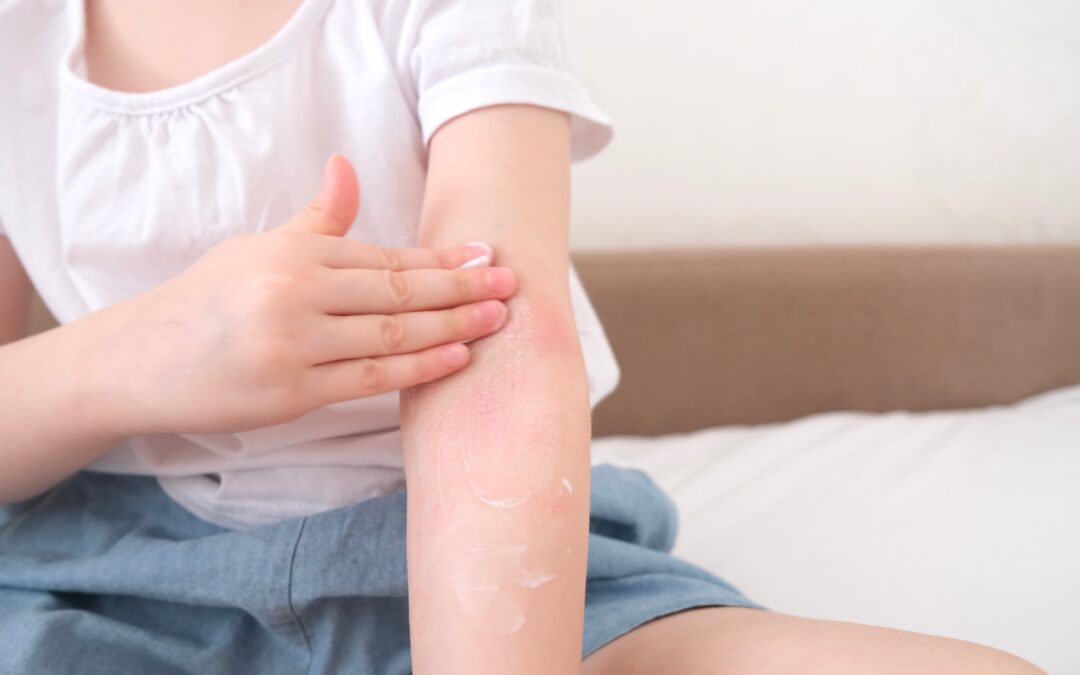Understanding Eczema and Naturopathic Eczema Management
Eczema, a common skin ailment affecting people of all ages, can be a source of considerable discomfort and frustration. Characterised by inflamed, itchy, and often irritated skin, eczema demands effective management to alleviate symptoms and improve overall skin health. While conventional treatments can provide relief, many individuals are turning to naturopathic approaches to address the root causes of eczema and find lasting solutions.
What is Eczema?
Scientifically referred to as atopic dermatitis, eczema is a chronic skin condition that can be hereditary and is often associated with an overactive immune response. This condition affects millions worldwide and can significantly impact their quality of life. Common symptoms include dry, itchy, and irritated skin, which can cause discomfort and decreased well-being.
Eczema is a complex condition with multiple potential triggers and contributing factors. While genetics play a role in predisposing individuals to eczema, environmental elements and allergens can also play a significant role in its development and exacerbation. Common environmental triggers may include exposure to harsh weather conditions, irritants in skincare products, or contact with allergenic substances like pollen or pet dander. Understanding these triggers and factors is crucial in effectively managing eczema and providing individuals with the knowledge to make informed choices about their skincare routines and lifestyles.
Common symptoms of eczema include:
- Severe Itching: Severe itching is a common and distressing symptom that often comes with eczema. This strong itching happens because the skin’s protective layer doesn’t work well in people with eczema. It makes the skin lose moisture and lets in things that can make it more irritated, like allergens. When you feel this intense itching, you might scratch your skin a lot, making things worse. It can lead to even more irritation and could harm your skin.
- Inflammation and Redness: When you have eczema, the affected skin usually looks red and swollen and can feel sore because of inflammation. This happens because your skin is reacting to something it doesn’t like, making it turn red and puffy. The affected areas might also be sensitive or painful to touch. Understanding these signs of inflammation is essential in recognising eczema, as they are key indicators that your skin is not feeling its best and may need some care to help it calm down and feel better.
- Dryness and Flaking: People with eczema often have very dry skin, and it can get so dry that it starts to crack or peel. This dryness happens because their skin struggles to hold onto moisture properly. As a result, the skin can feel rough and might even have tiny flakes or scales.
- Blisters or Crusts: In some cases, especially when eczema is quite severe, it can cause the skin to develop small fluid-filled blisters or hard, crusty patches. These blisters can look like tiny bubbles under the skin, while the crusts might be rough and scaly. These skin changes can be distressing, as they can be itchy and uncomfortable. It’s important to be aware of these symptoms, as they indicate that your eczema needs more attention and care to help your skin heal and feel better.
- Oozing or Weeping: Some individuals with eczema may experience oozing or weeping from affected areas of the skin.
Naturopathic Approaches for Eczema Management
Naturopathic medicine emphasises treating the whole person, focusing on underlying causes, and enhancing the body’s innate ability to heal. For individuals seeking natural solutions for eczema, naturopathic approaches offer a holistic perspective and aim to identify and address the root causes of this condition. Here are some informative strategies that may provide relief:
- Dietary Changes:
- Food Allergies: Identifying and eliminating potential food allergens is a crucial step. Common triggers include dairy, gluten, eggs, and nuts. Collaborating with a naturopathic practitioner or allergist to pinpoint food sensitivities is advisable.
- Anti-Inflammatory Diet: Adopting an anti-inflammatory diet with a high intake of fruits, vegetables, and omega-3 fatty acids can help reduce inflammation and support skin health.
- Herbal Remedies:
- Topical Herbs: Herbal creams and ointments containing ingredients like calendula, chamomile, and liquorice root can provide relief from itching and inflammation when applied to the affected areas.
- Internal Herbs: In some cases, naturopathic practitioners may recommend herbal supplements to address underlying issues contributing to eczema, such as immune system imbalances.
- Probiotics:
- Maintaining a healthy balance of bacteria in your gut, which you can achieve through probiotics, might be a way to make your immune system work better and lower inflammation. This could be good news for people dealing with eczema. Eczema can be connected to how our immune system reacts and how our skin gets inflamed. By taking probiotics or eating foods that have these helpful bacteria, you can strengthen your immune system and reduce some of the redness and swelling that comes with eczema. It’s like giving your body a little extra help to fight against eczema and make your skin feel better.
- Skin Hydration:
- To keep your skin moist and prevent eczema from worsening, using natural moisturisers and avoiding harsh skincare products with many chemicals can be helpful. Natural moisturisers, like creams or lotions made from gentle ingredients, can help lock in the moisture your skin needs.On the other hand, some skincare products with harsh chemicals might make your skin more irritated and dry. So, choosing products that are kinder to your skin can make a big difference in how your skin feels and looks, and it can help prevent eczema from flaring up, which means less itching and discomfort.
- Stress Management:
- Stress is a well-known factor that can make eczema worse. When stressed, our bodies can react in ways that lead to more itching and discomfort. However, some helpful techniques can make a big difference in managing stress and caring for your skin.
Deep breathing techniques, yoga, and meditation can be beneficial. These promote general well-being by assisting your body in de-stressing and calming down. While yoga uses gentle movements and breathing to ease tension, meditation focuses on focusing your mind and letting go of problems and stress. Simple methods such as deep breathing exercises involve taking slow, deep breaths to help you mentally and physically relax. By consistently using these stress-reduction methods, you can not only lessen the symptoms of your eczema but also enhance your overall sense of well-being and find it easier to handle life’s obstacles.
- Stress is a well-known factor that can make eczema worse. When stressed, our bodies can react in ways that lead to more itching and discomfort. However, some helpful techniques can make a big difference in managing stress and caring for your skin.
- Identifying Environmental Triggers:
- Identifying and minimising exposure to environmental triggers, such as pollen, dust mites, or pet dander, is crucial for managing eczema, especially when allergies are contributing factors.
- Holistic Assessment:
- When creating a treatment plan, naturopathic practitioners look at the bigger picture by considering a person’s overall health, their lives, and their environment. Instead of a one-size-fits-all approach, they focus on tailoring the treatment to suit each individual. This means that the plan is designed to provide relief for the short term and to positively impact your health in the long run so you can feel better and stay that way.
It’s essential to note that naturopathic approaches for eczema relief may require some patience as results can vary from person to person. Consult a qualified naturopathic practitioner or healthcare provider specialising in naturopathic eczema treatments. This way, you can receive a comprehensive and individualised approach that considers your needs and health status.
In summary, eczema is a multifaceted skin condition with diverse triggers and symptoms. Naturopathic approaches offer a holistic and personalised way to manage eczema by addressing root causes and enhancing overall skin health. Suppose you or someone you know is dealing with eczema. Exploring these natural alternatives with a qualified naturopathic practitioner can provide valuable insights and pave the way towards a more comfortable and healthier skin journey.

